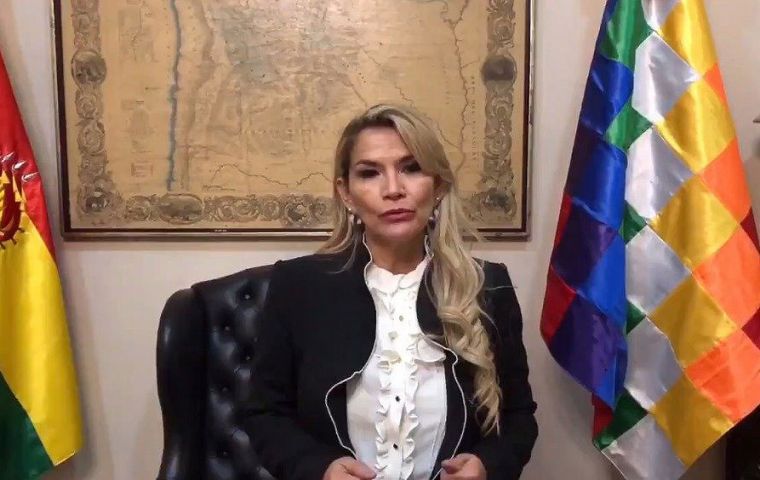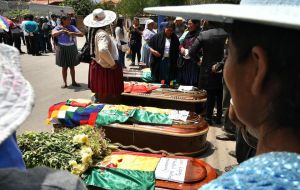MercoPress. South Atlantic News Agency
More clashes in La Paz but there is also a tentative agreed date for new elections, January 12
 Añez, a former opposition Senator who took office in a power vacuum, has grappled with a wave of protests against her interim government
Añez, a former opposition Senator who took office in a power vacuum, has grappled with a wave of protests against her interim government  At least 36 people have been killed in clashes since Morales resigned on Nov. 10 under pressure from protesters, civic leaders and security force
At least 36 people have been killed in clashes since Morales resigned on Nov. 10 under pressure from protesters, civic leaders and security force  Morales, who has been granted asylum in Mexico, has said he was toppled by a racist rightwing coup and has suggested he would return
Morales, who has been granted asylum in Mexico, has said he was toppled by a racist rightwing coup and has suggested he would return Supporters of ousted Bolivian leader Evo Morales marched into the capital La Paz on Thursday carrying coffins of people killed in clashes with the military and police, drawing attention to the human cost of the crisis in the South American nation.
Security forces fired tear gas to disperse the crowds after demonstrators placed one protester’s coffin and an effigy of interim President Jeanine Añez on top of an armored military vehicle and tried to enter the square where the presidential palace is located. Añez, a former opposition Senator who took office in a power vacuum last week, has grappled with a wave of protests against her as she has tried to move the landlocked country past Morales’ nearly 14-year leftist rule.
At least 36 people have been killed in clashes since Morales resigned on Nov. 10 under pressure from protesters, civic leaders and security forces, after an international audit found serious irregularities in the vote-count of the Oct. 20 election that gave him an outright victory and fourth straight term.
Morales, who has been granted asylum in Mexico, has said he was toppled by a racist rightwing coup and has suggested he would return. On Thursday, he said on Twitter that an international “truth commission” would be formed to verify whether there was electoral fraud.
But lawmakers with Morales’ Movement for Socialism (MAS) party appeared to ready to move on without him. They have agreed to work with their opponents to pass a law to annul the Oct. 20 vote to forge a path toward new elections
Some also called on the former president’s supporters to halt protests, something Morales has yet to do.
“We have to pacify the country. I want to publicly ask the population, the followers of the Movement for Socialism, to stop the protests and think about the new leaders in our political party,” Henry Cabrera, senior MAS member and vice president of the house of deputies, was quoted.
Cabrera said MAS would contest the next elections with new, young candidates, and that Morales and his former vice president would not be among them.
Due to the strained situation, credit ratings agency Fitch on Thursday downgraded Bolivia’s long-term debt to B+, from BB- previously. It said in a statement that the country’s outlook remains negative “due to downside risks to growth and macroeconomic stability from persisting social unrest.”
MAS has proposed new elections for Jan. 12, according to a draft bill, and Roxana Lizarraga, Communications Minister said she thought elections before Jan. 20 were feasible. A deal with MAS lawmakers, who control two thirds of parliament, would help legitimize the next vote and government.
Bolivia’s new foreign minister, Karen Longaric, accused Morales of fanning tensions to destabilize the country so he could try to return and take control.
“The country cannot be pacified as long as Evo Morales does not abandon that aggressive attitude of confrontation, of provocation,” Longaric said on Thursday. She also blamed radical armed groups for instigating clashes in protests.
Human rights activists have been alarmed by the spike in deaths and have urged the interim government to repeal a decree that granted the military broad discretion in the use of force, something one of Añez’ ministers told local media the government was willing to do to further dialogue.




Top Comments
Disclaimer & comment rulesCommenting for this story is now closed.
If you have a Facebook account, become a fan and comment on our Facebook Page!